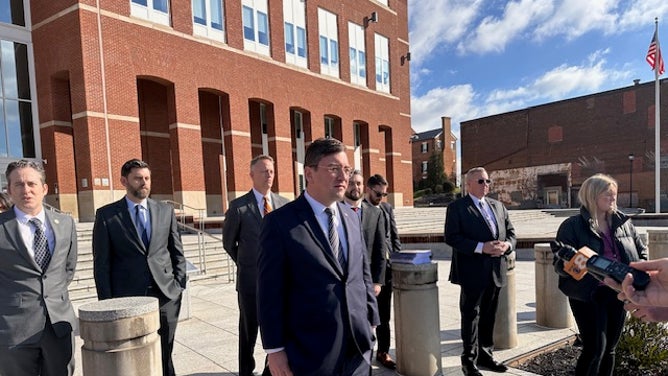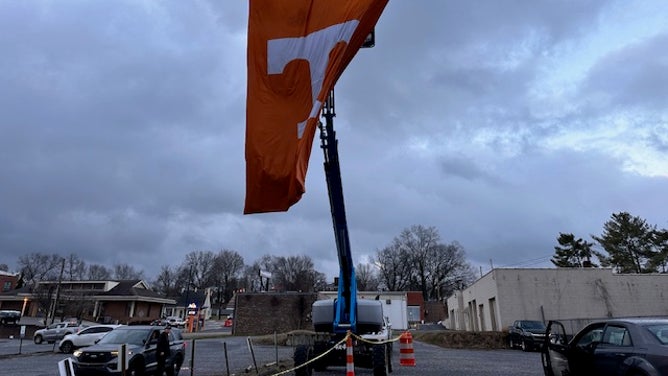State Of Tennessee And NCAA Battle In Courtroom, With A Big Orange Flag Welcoming All Parties
Greeneville, TENN - A big orange Tennessee flag greeted members of both sides arguing against an NIL injunction Tuesday morning in the James H. Quillen United States Courthouse. No, there were not fans of a particular team waiting outside the courthouse for all parties to arrive, but this certainly set the stage for 60 minutes of arguments.
Over 26 police officers were called to stand guard outside the courthouse, which was certainly not needed in the case of crowd control. A few fans wearing a ‘Power T’ cap were seated in the courtroom next to media members and the general public.
This had all the makings of a fight against the NCAA over NIL rights, that took a turn toward the ongoing action against the University of Tennessee.
Marching into the courthouse with four boxes of paperwork and binders, the NCAA was ready to make its case on whether or not conversations regarding NIL before a prospect enrolls at a school was at the forefront. Unfortunately for the lawyers representing the organization, there were many times that the judge seemed to catch them offguard with questions.
While the entire lawsuit filed by the states of Tennessee and Virginia centered around a recruits rights to negotiate NIL rights before enrolling at a particular school, it was easy to see that this case also centered around the ongoing investigation into the Tennessee athletic department.
"After the (Florida) Gators, the Vols are on the chopping block," attorney Cam Norris argued for the plaintiffs. This came after the judge asked whether or not this injunction was filed to keep the NCAA from furthering their inquiry into Tennessee.
"We're in trouble again," Norris argued before the court. A lot of what the State of Tennessee argued in the proceedings on Tuesday was in-response to prospects not being able to engage in conversations around their NIL value with opposing schools.
Following the judge asking the state if their would be a big war for athletes if this injunction was granted, the State argued that these athletes deserve the right to find a true-market value, which they cannot do if they are not allowed to compare offers in the current system.
In terms of the investigation into Tennessee athletics, attorney Cam Norris made it clear that "We hope the NCAA stops the investigation", noting that this case would play a factor in how that proceeds.

State of Tennessee attorneys meet outside the courthouse following the induction hearing against NCAA
NCAA Fumbles The Argument On When Players Can Speak To NIL Reps
One of the key points of this hearing centered around when a prospect can start discussing potential NIL offers from representatives of a collective. The second key argument was how the NCAA investigation into Tennessee athletics would continue forward under this potential granted injunction.
"I'm not aware the NCAA has leaked any evidence pertaining to the investigation," the NCAA attorney mentioned.
While this was a hot-button issue in the courtroom, the judge made it a point to talk about players being able to use their leverage when it comes to what NIL opportunities are available.
"They are not being able to use their leverage before signing?," Judge Corker asked the NCAA attorney. While at the same time noting that it sounds as if a player would suffer some type of harm if they were left in the dark regarding NIL opportunities.
"We don't think there is much harm. Student athletes have ways to compare values of where they should attend schools," NCAA attorney noted about websites that post valuations on current prospects.

A Tennessee Flag Is Hung Outside the Courthouse in East Tennessee before the NCAA hearing
The key argument from the NCAA centered around the irreparable harm that it says the states of Tennessee and Virginia failed to provide evidence of. In the course of their discussion, the argument around whether there is a clear difference in professional and college sports now when it comes to market caps on spending.
When the NCAA was asked about the timing of when a player can speak with a collective or not is when things took a turn for the worse pertaining to their argument.
A fumble of words from the NCAA led to confusion in the courtroom. It seemed the NCAA did not have a clear answer on when a student athlete can actually discuss potential opportunities at schools. Unfortunately for the NCAA's attorney, he seemed befuddled by his own clients rules, which led to a moment of confusing statements, a clear sign that the organization is having trouble classifying.
The attorney had a hard time distinguishing the difference between a recruit negotiating an NIL offer, which is not allowed by the NCAA, while at the same time engaging in conversations with collectives about their NIL market value, which is clearly allowed by the organization.
Where Do We Go From Here?
The judge declared that he hoped to have a decision in ‘short order’, which could mean Wednesday or two weeks from now. If there was anything that came out of this hearing, it was that there is not a clear argument on the timing, or potential harm that discussing NIL deals with prospects could hurt the NCAA.
Sure, some of this would obviously be looked at as ‘pay for play’, but both sides were lacking on a response to this definition, most likely purposely staying away from the subject. The NCAA already knows this exists, so putting the genie back in the bottle seems like a no-win situation.
If both states are granted this injunction before a trial, it's clear that this would be a nationwide ruling that would effect all potential student athletes.
In one of the funnier moments of the morning, the lawyer representing the states pointed out that they are not arguing on behalf of the SEC, even though the conference is working with the NCAA on a number of matters.
"We are not the SEC, and god forbid we're not the ACC."
Now, we wait for the judge to rule in this interesting case that has schools around the country tuning in for multiple reasons.